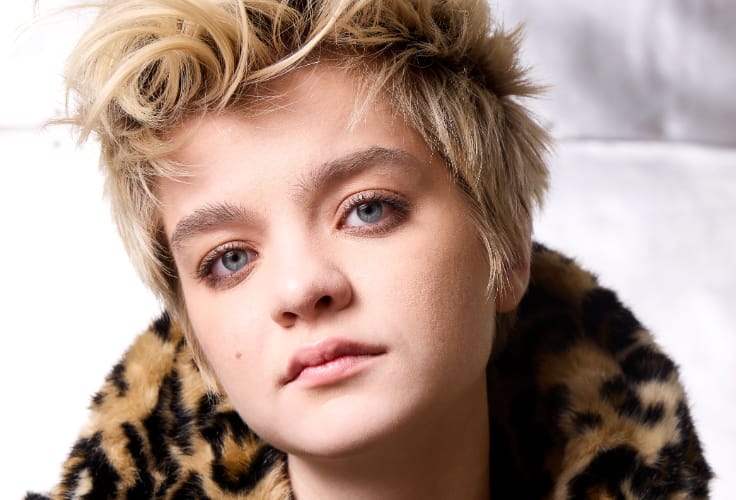At just 19 years old, Presley Alexander is proving to be one of Hollywood’s most exciting and important new voices.
The queer, non-binary, and autistic actor is earning widespread attention for their breakout role in Amazon/MGM’s The Accountant 2—starring alongside Ben Affleck. Through a diversity-forward initiative, Presley brings a powerful authenticity to the role of Lane, a neurodivergent hacker whose brilliance is matched by vulnerability.
Today, HOLR is sitting down to chat with Presley about how it’s not just their performance that’s making headlines—their presence on screen marks a groundbreaking moment in representation, pushing Hollywood closer to stories that reflect real-life neurodiverse experiences with nuance and care. Keep reading to learn all about their journey, how they brought the character of Lane to life in The Accountant 2, and why authentic storytelling matters now more than ever.
The Accountant 2 is your breakout film role. What was it like working with director Gavin O’Connor to shape a character so deeply connected to your own lived experiences?
Gavin is incredible, and I’m very lucky to get to work with him. He’s very attentive and really wants to get it right, if that makes sense. His commitment to diversity is a part of his commitment to telling a story that feels authentic. He had experts on all sorts of subjects, and he listened to what everybody had to say. There were no wrong answers on set. We just got to play and make a movie. My first day on set was just talking with Gavin and my fellow castmates about our experiences with neurodiversity. He made sure that the set was quiet and not too bright or overstimulating for us without anyone having to ask. And we just talked about our lives, our interests, and what would make us feel seen. The next day, he came back and had worked through the scene to make sure everything we said was represented, down to the tiny details on set. My workspace was specifically designed to look like an area where I’d actually be able to work comfortably, and was decorated with my special interest. I was speechless, really. It’s very rare to have the neurodivergent experience be seen so well & taken so seriously.
You were cast through a diversity-forward initiative—how do you think programs like these are changing the landscape for queer and neurodivergent actors in Hollywood?
At this point, there’s no excuse for not casting with diversity in mind. Anyone can be an actor, and your lived experience shapes how you portray characters. I don’t see why you *wouldn’t* want to cast someone with a lived understanding of the character you’re trying to write. Because then you’re not just hiring an actor — you’re hiring an advisor and a storyteller who can make sure your story resonates with more people. It’s genuinely just good for everyone involved! I have no idea why more people aren’t doing it.
You’ve been a vocal advocate for representation since childhood, especially through your YouTube channel ActOutGames. How has your advocacy shaped the kinds of roles and stories you want to pursue today?
My activism has given me a very keen awareness of how representation and diversity can change the world. Through YouTube, I connected with a community of people like me, and that changed my life. Being queer or neurodivergent is often a very isolating experience. When I was younger, I always wanted to see more people like me in the media. People who society considered ‘normal’ always got to have role models and heroes who were like them — why not us? I think that neurodiversity representation is especially important right now, when the public perception of autism is so skewed. I want to prove that we’re just as capable as anyone else, and that there are a lot more of us than one would think.
Outside of acting, your work as an entomologist and science communicator is fascinating. Do you find any parallels between your love for insects and your experience navigating the entertainment industry?
Well, for starters, bugs are small and misunderstood, and so am I! On a more serious note, science teaches you how to ask questions, which has been an invaluable skill for me as an actor. When you’re an actor, you have to create an entire human being out of a script, which is very challenging! But science gives you the ability to analyze all the details and put together a complete picture. Every character is like a little ecosystem of behaviors and instincts, and sometimes the stuff that seems small is what makes them feel real. Also, both fields are full of weirdos, and I say that with love.
What would you say to other young neurodivergent or queer creatives who might not yet see themselves reflected in mainstream media?
Be proud of who you are, and don’t let anyone take that from you. The world is hostile to people like us right now, and it’s scary. It’s tempting to want to mask who you really are — but that’s what they want. Quiet people are easier to erase. Be unapologetic about who you are, no matter if the world is ready for it or not. It’s not fair, but we have to fight to be seen. And if we’re lucky, we’ll make it an easier fight for the people who come after us.
What are the biggest stories trending online today? Read the latest here
Published by HOLR Magazine
Photo Credits: Cathryn Farnsworth
Stylist: Nicholas Sauer





